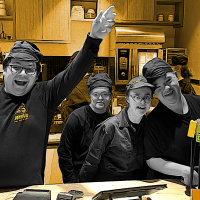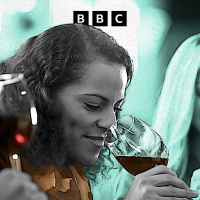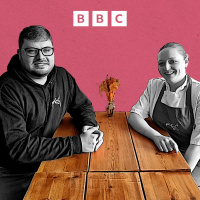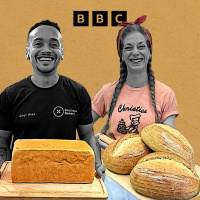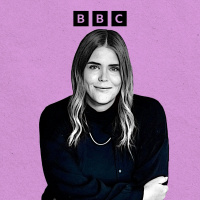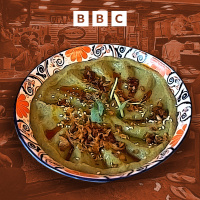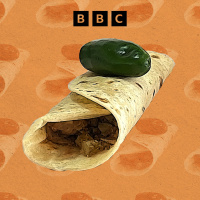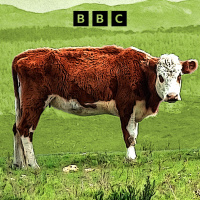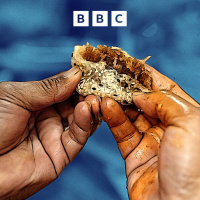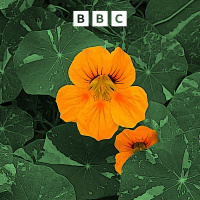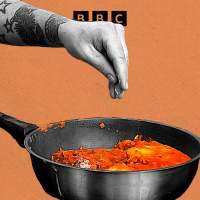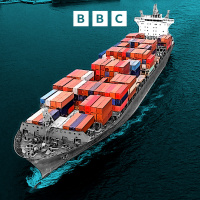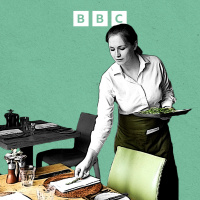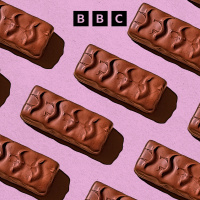Sinopsis
The Food Chain examines the business, science and cultural significance of food, and what it takes to put food on your plate.
Episodios
-
'Happy' cafes
10/07/2024 Duración: 26minOf the tens of millions of people around the world with autism or down syndrome, only a tiny fraction is in paid employment. But cooking, making drinks and waiting tables is work where people with learning disabilities can shine. John Laurenson takes us to a Café Joyeux (Happy Café) in Paris, one of a fast-growing chain of cafe-restaurants where most of the staff have autism or down syndrome and where the croque monsieur comes with a smile. We also hear from a cafe in Mumbai launched by the mother whose daughter has autism and, in Turkey, the KFCs with a difference. Find out how café work can transform the lives of employees and owners. Presenter/Producer: John Laurenson(Image: Louis, Laura, Anne-France and Arnaud. Credit: BBC)
-
Your taste is unique
03/07/2024 Duración: 30minTaste, it turns out, is not a matter of opinion. Scientists have discovered that your perception of taste is informed by your genetics. When we eat or drink something, we may be having an entirely different experience to the person we’re sharing a meal with, or the chef who has prepared it, or the critic who has recommended it. In this programme Ruth Alexander explores her likes and dislikes and how they might be informed by biology. Ruth meets Laura Kent of the Yorkshire Wine School in the UK who helps her learn about her sensitivity to acidic and bitter flavours. Ruth speaks to Anne Fadiman, writer and Professor of creative writing at Yale University in the US, who dislikes wine, despite her wine critic father loving it. Danielle Reed, Chief Science Officer at the Monell Chemical Senses Center in Philadelphia, US, explains the science. Tim Hanni, Master of Wine, and author of ‘Why You Like The Wine You Like’ argues that the wine industry is not paying enough attention to individual tastes. Where does thi
-
How safe is the soil in our cities?
26/06/2024 Duración: 26minMore of us are living in cities and urban farming is on the rise. Can you be sure the city soil you’re growing in is clean enough? Industry and traffic can contaminate land, but there are ways to deal with the problem. Ruth Alexander finds out how to test soil, how to clean it, and which fruit and vegetables are the safest to grow on former industrial and commercial sites. If you would like to get in touch with the show, please email: thefoodchain@bbc.co.uk(Picture: A garden trowel with some soil on it)Producer: Hannah Bewley
-
Food double-acts: Couples
19/06/2024 Duración: 29minWhat’s it like spending 24 hours a day together? Ruth Alexander speaks to couples who run restaurants. She hears how they met, what they argue about and why being a couple might be good for business. Ruth visits Andrea Follador and Jazz Navin at ‘The Perfect Match’ restaurant in Sale, in the North West of England. Jazz is the chef and Andrea is the sommelier, the two met working at Gordan Ramsay’s ‘The Savoy Grill’ in London. Ruth speaks to Francisco Araya and Fernanda Guerrero, chefs who have lived and worked together in their native Chile, China, and now Singapore where they run fine dining ‘Araya’ restaurant. Rita Sodi and wife Jody Williams ran a restaurant each, and then decided to open one together, 'Via Carota' in New York, United States. Today they run five bars and restaurants together in the city. If you would like to get in touch with the show please email thefoodchain@bbc.co.uk. Presented by Ruth Alexander. Produced by Beatrice Pickup. (Image: Andrea Follador and Jazz Navin who run ‘The Perfect M
-
The bakers
12/06/2024 Duración: 26minIn a world where ingredients cost more due to war and inflation how is easy is it to make and sell our daily bread? Ruth Alexander speaks to three bakers about how they started in the industry, the highs and lows and economic pressures in their part of the world. Alex Oke is the owner of XO Boutique Bakery in Lagos, Nigeria, Tracey Muzzolini is the owner of Christies Mayfair Bakery in Saskatoon, Canada and Samer Chamoun is the owner of The Lebanese Bakery, a chain of 12 branches including Beirut, Cairo and London. Presented by Ruth Alexander. Produced by Rumella Dasgupta.(Image: Alex Oke holding a loaf of Nigerian agege bread and Tracey Muzzolini holding a loaf of sourdough bread. Credit: Donna Martins/Chelsea Walton/BBC)
-
Taking weight-loss drugs
05/06/2024 Duración: 30minRuth Alexander speaks to patients about their experiences of weight-loss drugs. The new class of drugs impact appetite, making you feel full sooner, and slowing the rate at which your stomach empties. Known as GLP-1 medications, studies suggest that patients can lose 10% or even up to 25% of their body weight depending on which drug they use. For many who have struggled with obesity and obesity related disease the drugs have the potential to transform their health. However some patients have struggled with the side effects of the drugs and the manufacturers’ own studies indicate that if people stopping taking them, much of the weight lost is regained, making them drugs for life for some. Ruth Alexander speaks to Professor of Cardiometabolic Medicine, Naveed Sattar, at Glasgow University who is Chair of the UK government’s obesity mission. He explains how these drugs work and the potentials costs and savings for the National Health Service, or NHS. Adrienne Bitar, historian at Cornell University in New York,
-
Eating in the heat
29/05/2024 Duración: 26minDevina Gupta takes a food tour of her home city of Delhi to see how people are adapting to rising summer temperatures. In May this year the city saw a record temperature of almost 50C, and knowing what to eat in such heat can be a challenge. The changing climate is sparking innovative recipes in restaurant kitchens and bringing traditional practices back to people’s kitchens. Devina tries old favourites at street markets, a modern twist on a classic drink at a high end restaurant and is (almost) convinced that a vegetable she has hated since childhood might work wonders in the heat. She hears from public health expert Dr Samar Husayn about why the cold, sweet treats you might reach for on a hot day aren’t always the best. And she sees the difference between how those who have air-conditioned homes and those who don’t are coping. Presenter: Devina Gupta Producer: Hannah Bewley (Image: A bowl of gourd dip with restaurant workers in the heat in the background. Credit: BBC)
-
The burrito story
22/05/2024 Duración: 26minRuth Alexander explores the origins and evolution of the humble grab-and-go food the burrito, which started life in northern Mexico, before crossing over into the US and becoming a hit around the world. Versions of the spicy wrap can be enjoyed in restaurants, street food shacks and supermarket home meal kits all over the world. We explore the burrito’s contested origins, find out why some Mexican food purists dislike the popular menu item and ask what the future holds for it, and the cuisine more broadly. If you would like to get in touch with the show, please email: thefoodchain@bbc.co.uk (Picture: a burrito in a restaurant in Juarez, Mexico. Credit: Vianey Alderete Contreras/BBC)Presented by Ruth Alexander. Produced by Sam Clack. Additional reporting by Vianey Alderete Contreras in Juarez, Mexico and El Paso, United States.
-
Can beef be carbon neutral?
15/05/2024 Duración: 26minCows emit greenhouse gases when they eat, which contributes to global warming. But is it possible to produce meat in a climate-friendly way? Grace Livingstone visits a carbon neutral certified ranch in Uruguay, where farm manager Sebastian Olaso shows her around. She also meets Javier Secadas, a small farmer who raises cattle on natural grasslands, and agronomist Ignacio Paparamborda, from the University of the Republic in Montevideo.Grace hears from Pete Smith, Professor of Soils and Global Change at the University of Aberdeen, and Dominik Wisser, Livestock Policy Officer, from the United Nations’ Food and Agriculture Organisation. She tries to find out if it is possible to produce meat in a way that is both good for nature and the climate. Or whether we need to stop eating meat to cut emissions.Presenter/Producer: Grace Livingstone (Image: Cows grazing in Uruguay. Credit: Getty Images)
-
Eat with your hands
08/05/2024 Duración: 30minWhy eat with your hands? Many food cultures around the world eat using hands, and most of us use our hands some of the time. Do we really need cutlery or chopsticks to eat a salad, peas or rice? And if you were to tackle soup or stew with your hands, how would you go about it? Michael Kaloki reports from Nairobi, Kenya, where the staple dish ugali, made from maize flour, is traditionally eaten by hand. Michael has observed that people increasingly use cutlery to eat the dish, and he speaks to restaurateurs and customers about why that might be, and what might be lost. Ruth Alexander learns about the etiquette of eating by hand with food writer and consultant Karen Anand in India. And Ruth explores whether food might be more enjoyable, and even taste better, when eaten by hand. Psychologist Professor Charles Spence from Oxford University, and chef Jozef Youssef of Kitchen Theory in the UK share their research. If you would like to get in touch with the show, please email: thefoodchain@bbc.co.uk Presented by
-
Can I eat this flower?
01/05/2024 Duración: 26minStunning cakes, colourful salads and intricate garnishes use flowers to entice customers, but there’s more to this trend than just beautiful social media pictures. Many cultures around the world have eaten flowers for centuries, and some of them pack a serious punch. Devina Gupta explores the history of edible flowers and visits a site in the UK where they’re grown all year round. She gets quite a shock when trying one particular variety. We find out why flowers are used on food nowadays, and how generations of knowledge about their use and properties were lost when they were brought to Western countries. If you would like to get in touch with the programme, email thefoodchain@bbc.co.uk. Presented by Devina Gupta Produced by Julia Paul and Beatrice Pickup (Image: A nasturtium flower growing. Credit: BBC)
-
To salt or not to salt?
24/04/2024 Duración: 26minDo you know how much salt you should be eating? And if I tell you it’s less than 5 grams a day, do you know how much that is? Ruth Alexander explores the wonder of salt and why chefs think their job would be pointless without it and why the impact it’s having on the food might surprise you. Professor Paul Breslin tells us about the “magical” chemical reaction happening on your tongue when you eat salt, and why your brain responds to that. We hear about what eating too much salt can do to you from an expert in Australia, as well as a mother in Kazakhstan who cut out salt almost completely – in a country which has one of the highest consumptions in the world. If you would like to get in touch with the show, please email: thefoodchain@bbc.co.uk Presented by Ruth AlexanderProduced by Hannah Bewley (Image: A chef sprinkles salt on a pan of food. Credit: BBC)
-
Hungry at sea
17/04/2024 Duración: 26minOver two million people work in the international shipping trade, and they are often at sea for months at a time. That’s a lot of meals being made by the cook on board, and their work is crucial for keeping the crew happy. Ruth Alexander hears from seafarers about why that makes “cookie” the most important person on board a ship and why, in some cases, crew members are going hungry. A former captain of merchant vessels tells us how food is used for so-called “facilitation payments” to corrupt officials, and why crews can sometimes be powerless to stop port officials filling up suitcases with food from the ship’s stores. We also hear about international efforts to try to tackle corruption in ports and increase welfare standards for seafarers. If you would like to share your own experience, please email: thefoodchain@bbc.co.uk Presenter: Ruth Alexander Producers: Izzy Greenfield and Hannah Bewley (Image: A container ship at sea. Credit: Getty Images)
-
Food double-acts: TV chefs
10/04/2024 Duración: 29minWhat’s the secret behind the on-screen chemistry shared by some TV chef duos? The recent death of Dave Myers, one half of ‘The Hairy Bikers’ with Si King, has prompted this programme celebrating successful food friendships. Dave and Si made food shows and cookbooks that took their fans all over the world, and off-screen they were close friends. In this programme Ruth Alexander speaks to two chefs who have found success in food with a good friend. Ruth Rogers, co-founder of The River Cafe restaurant in London, talks about her partnership with the late Rose Gray, who died in 2010. Together they presented ‘The Italian Kitchen’ for Channel 4 in the UK in 1998. Italian chef Gennaro Contaldo talks about his long friendship and work with the late chef Antonio Carluccio, and the TV series they made together for the BBC, ‘Two Greedy Italians’ in 2011 and 2012. Gennaro also talks about his friendship with the chef Jamie Oliver to whom he’s been a mentor. Presented by Ruth Alexander. Produced by Beatrice Pickup. (Im
-
How to run a restaurant
03/04/2024 Duración: 26minThese are tough times for restaurants. If the pandemic's rolling lockdowns were not bad enough, independent eateries now find themselves caught on a conveyor belt of crises: inflation, labour shortages and high rents. That is without mentioning the post-Covid agoraphobic “hermit consumer", who prefers to hunker down indoors than splash the cash on going out. If the stats are to be believed 60% of restaurants fail in the first year, 80% after five. And yet despite the long odds many are still seduced by TV dramas like The Bear into turning their passion for cooking into a business. We hear from some of the best in the business for a steer on how to keep this labour of love alive. David Reid speaks to leading restaurant critic Jay Rayner, culinary specialist Ashley Godfrey, top chef Joseph Otway and restaurant operations manager, Sam Wheatley as they lift the lid on the trade secrets they have accumulated from years on the restaurant front-line. The programme also asks what a world without independent restaura
-
The real Willy Wonkas
28/03/2024 Duración: 27minStep inside the chocolate factory to hear the secrets of what it’s like to invent sweet treats for a living. Find out why chocolatiers think the raw material is like a “needy child”, but can also bring great joy to people’s lives. And hear the family story of the invention of one of the best-known British chocolate bars, with a trip to an archive of hidden stories from the confectionary industry – and some well-preserved sweets. If you would like to get in touch with the show, please email: thefoodchain@bbc.co.uk Presenter: Ruth Alexander Producer: Hannah Bewley (Image: Chocolate bars on a colourful background. Credit: Getty)
-
Fasting and feasting
21/03/2024 Duración: 32minFasting has been a religious and cultural practice for thousands of years, why do people do it? What happens to your body when you fast? The Food Chain speaks to a British family breaking their fast during Ramadan, a woman in India completing a day long fast for Mahashivratri and explores why the practices around Lent have changed over the years. An expert on intermittent fasting talks us through what is happening to our bodies, and why it might have hidden benefits. In this programme, Rumella Dasgupta explores the tradition of religious fasting with what to eat and what not to eat in three major faiths. If you would like to get in touch with the programme, email thefoodchain@bbc.co.uk. Presented by Rumella Dasgupta. (Image: a family in Manchester breaks their fast together with dishes spread out on a cloth on the floor. Credit: BBC)
-
Why we love dumplings
14/03/2024 Duración: 27minDumplings feature prominently in cuisines around the world. Some, like the Ghanaian kenkey, or the Irish dumpling, are balls of dough. But in many countries they’re filled with other ingredients. From the Russian pelmeni, to the Japanese gyoza, for centuries we’ve been putting meat, vegetables or cheese in small pouches of pastry, and making delicious snacks. So where did this idea originate? And are all these differently named dumplings connected?Ruth Alexander explores the history of this humble comfort food and hears how different dumplings are made. If you would like to get in touch with the programme, email thefoodchain@bbc.co.uk. Presenter: Ruth Alexander. Producers: Julia Paul and Rumella Dasgupta (Image: Dumplings and bowls of dipping sauce. Credit: BBC)
-
The fifth taste
07/03/2024 Duración: 30minSweet, sour, salty, bitter and... umami. Have you heard of the fifth taste? Umami, meaning ‘delicious flavour’ in Japanese, was discovered by a chemist in Japan in 1908 but it took nearly 100 years for it to be recognised as a fifth distinct taste. It is described by many as a savoury or meaty taste. In this programme Ruth Alexander learns about the chemist who first discovered umami, and the industrially produced version he created – monosodium glutamate, or MSG. It’s a food additive that’s been the subject of health scares, but today it’s one of the most tested additives in our food and considered to be safe for consumption. Yukari Sakamoto, trained chef and food tour leader in Tokyo explains how umami features in Japanese cuisine; she says miso soup is one of the best examples of maximum umami flavour. Professor Barry Smith, Director of the Centre for the Study of the Senses in the UK, explains the science behind umami and MSG. Calvin Eng, chef and owner of Bonnie’s restaurant in Brooklyn New York, is on
-
The school cooks
29/02/2024 Duración: 27minThree school chefs tell Ruth Alexander what it’s like serving up canteen food every day. Find out how they manage hundreds of hungry child customers, what pro tips they have for making vegetables seem delicious, and why they all find the job so satisfying. We hear from the USA, Liverpool in the UK and a school chef in the far north of Finland about the challenges of cooking mountains of meatballs, how to cope when the vegetable biriyani goes all over the ceiling, and why it’s one of the most rewarding – but probably overlooked – professions. If you would like to get in touch with the show, please email: thefoodchain@bbc.co.uk Producers: Hannah Bewley and Rumella Dasgupta (Image: a plastic lunch tray with meat, vegetables and gravy, fruit and a plastic cup. Credit: Getty Images/BBC)

